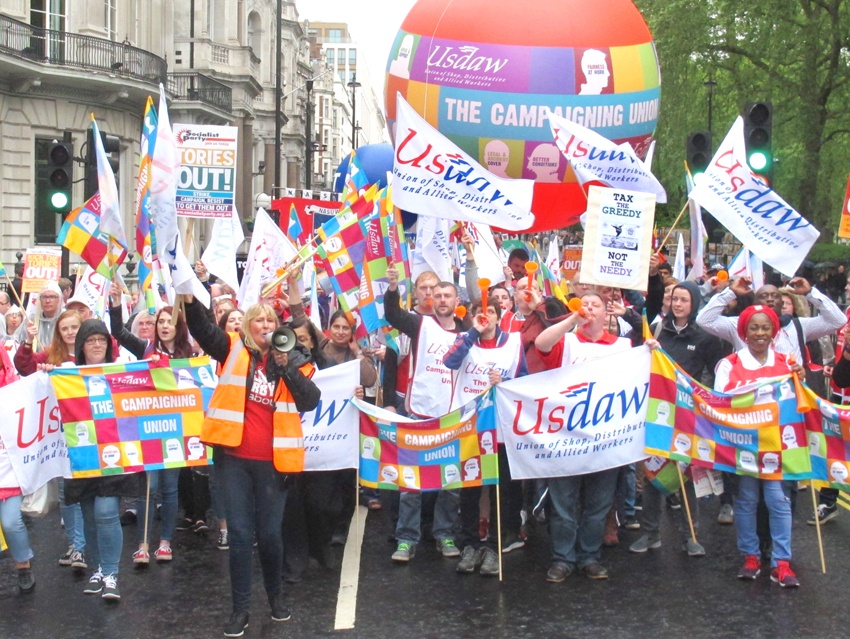By William F Warde
The recently announced elections to the USDAW (Union of Shop, Distributive and Allied Workers) national executive committee give a snapshot of this misunderstood union.
USDAW has around 360,000 members and two seats on the Labour Party NEC. This is not bad when you think that Unite and Unison, with two to three times as many members as USDAW, also have two. What is more, the USDAW leadership and its representatives at regional and national level on the NEC have been key enablers of Keir Starmer’s lurch to the right and his attacks on the democratic rights of members.
USDAW has around one third of its members in Tesco, under a ‘Partnership Agreement’ signed in 1998 where they get more or less exclusive contact with new recruits, sole recognition in the shops, and ‘access’ to senior management, but in return have given up the right of members to directly vote on pay offers. Instead, consultation on pay is through ‘staff forums’ in the stores.
As a result there is an internet forum called ‘verylittlehelps.com’ (see here and here) with over 5,000 members, arguing for better representation from USDAW in Tesco. They kind of have a point. After all, it’s coming to something when the staff in non-union Aldi and Lidl earn substantially more than USDAW-organised Tesco.
The other members are to be found in other retail chains like the Co-op or Morrison’s, DHL distribution, and in some food processing plants dotted around Britain. The closure of the Nestle factory in Norwich some years ago was a blow to the union, as is the proposed closure of Kellogg’s in Manchester.
Left-wing stirrings
USDAW appears to be solidly under the control of its own bureaucracy, but there have been stirrings below the surface. In 2018 there was shock across the union when socialist Amy Murphy won the election for union president, and three lefts were elected to the 15-member Executive. For some years Richie Venton, a well-known socialist, lately employed by IKEA, represented the Scottish division.
In 2021 the Broad Left candidate Andrea Watts lost to Jane Jones by around 4,000 votes (7,505 to 3,784), on a turnout of 4.3%. This time Jane Jones was elected unopposed.
Although in the recent 2024 EC elections the Broad Left failed to secure any representation on the Executive, they retain a presence in the regional structures. The Broad Left’s Ryan Aldred just missed election by less than 100 votes in an electorate of 42,000 in the South-west. Two divisions – Scotland and the North-east – were uncontested and in the others turnout nowhere surpassed 4.6%.
It is a myth that USDAW operates no-strike deals in Tesco; in 2021 the union was forced to ballot Tesco members in the distribution centres for a strike over pay. But it is certainly the exception rather than the rule. In Morrison’s, when members rejected a 2% pay award in June 2022, the case went to binding arbitration at ACAS under the terms of USDAW’s agreement with the company, and was determined at the lower figure.
Working-class organisation
The agenda of the 2023 USDAW conference ( Annual Delegate Meeting – ADM) shows the true picture of USDAW. Although under heavy control by the full-time apparatus, USDAW is a working-class organisation like any other union.

There were motions asking for renationalisation of water, abolishing tuition fees for NHS training courses, a minimum state pension of £250 a week, retention of the Universal Service Obligation for Royal Mail, and for Jeremy Corbyn to be re-admitted to the Labour Party:
“This ADM calls for the restoration of the Labour Whip to Jeremy Corbyn. The Forde Report completely cleared Jeremy of any wrongdoing. In the interests of unity before the next general election this should be done immediately. Jeremy has always stood shoulder to shoulder with the Trade Union Movement, including on the picket line. He has also received several standing ovations at our ADM in recent years. It is time he was reinstated as a Labour MP. “
No-one even spoke against it. But it must have made uncomfortable reading for the two full-time officers of USDAW who are the delegates to the Labour Party NEC, Michael Wheeler and Joanne Thomas.
On industrial matters, there were motions to allow one member one vote on Tesco pay offers, more use of strikes, to ban fire and rehire, opposing partnership deals, better trade union rights and an end to the signing of “No Strike” deals.
Vibrant activist network
So clearly there is plenty of life in the USDAW membership. In fact the union may have a more vibrant branch and activist network than Unite or GMB. The USDAW conference had 102 motions from 97 branches; by contrast Unite, with nearly three times the membership, could barely manage 40 motions from branches.
The union regularly brings its reps together on training events and schools, it has an excellent programme of seconding promising reps into full time organiser positions for a fixed term, and it does good work campaigning for legal protections for shop workers who face assault.
We can be confident that the USDAW leadership, just like the Royal College of Nursing (RCN), will be forced at some point to respond to its members and activists, on both industrial and political matters. If it doesn’t, the warning signs are there – the union’s membership has fallen by 80,000 since 2020.
No union has a divine right to exist. But by taking a bold stand on retail workers’ rights, returning to normal trade union procedures in Tesco, and giving voice to its working-class members’ political aspirations, USDAW could grow and surpass the previous membership of 460,000.



